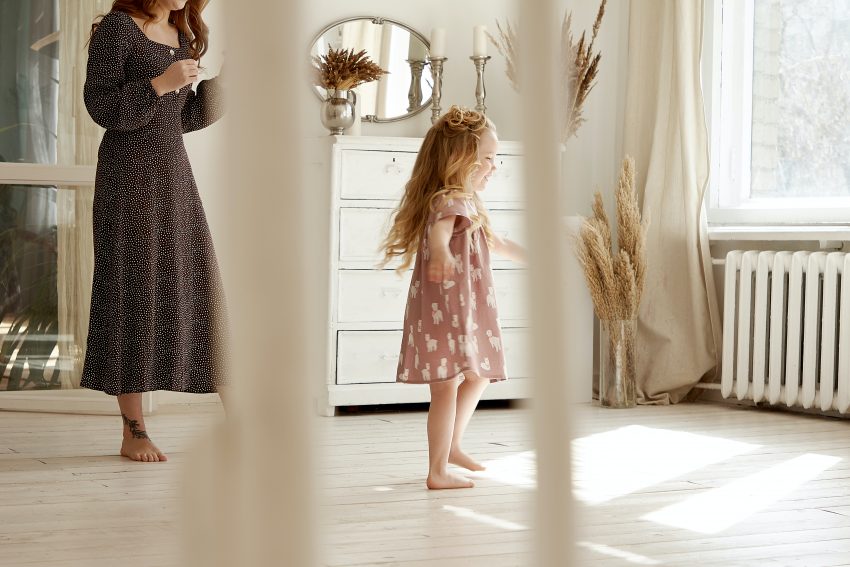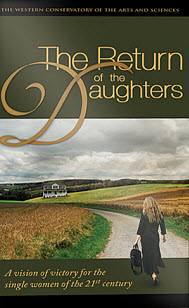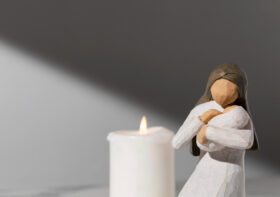“Return of the Daughters” A Review and a Challenge

Nota Bene: I wrote this post a while back when I first watched the film in December, and am not sure why I didn’t publish it then…. This topic has come up a couple times in various conversations I’ve had over the last several weeks, and so it seems as appropriate now as ever.
 “A Vision of Victory for the Single Young Women of the Twenty-First Century”
“A Vision of Victory for the Single Young Women of the Twenty-First Century”
This documentary compiled by Anna Sofia and Elizabeth Botkin embodies the thoughts and conclusions I have come to in the past several years, and I’m glad to see that I’m not the only one. The film showcases the lives of young women who, rather than pursuing independence and a worldly vision of success upon reaching an age of maturity, have chosen to remain living in (or return to) their fathers’ homes. They do not simply return for financial or mental reasons–like the many of our generation who seek solace from the pressures of living up to our culture’s selfish standards–but for reasons of conviction found in Scripture. Their aim is not merely to leech off their parents’ provision, but to continue in learning, embrace a culture of Biblical womanhood and prepare for whatever future stages in life God provides. They assist their mothers in caring for younger siblings; they contribute to the success of their father’s business; and they foster a relationship with their family that is irreplaceable and imperative to building a Christian culture.
But that is just a summary of the documentary itself — what I’d really like to address is the concept behind the movie. Voddie Baucham (father of one of the aforementioned daughters) addresses the Biblical basis for resisting the picture of the “liberated woman” that our culture seems to idolize:
Interestingly enough, the Bible doesn’t command women to become independent. It commands them to be submissive… Why? Well, because part of the Curse in Genesis chapter 3 is that Eve would have a desire, not just for her husband but, literally in the Hebrew, for her husband’s position. It is part of the fallen nature as a result of what happened with our first parents that women have this desire against the order that God ordained toward independence.”
From this, we discover that our culture’s bent toward the independent feminist is not surprising, but rather completely in line with the chaotic and broken human perspective that is a result of our inherited sin. But that does not mean it is something we ought to give into and pursue as we see the rest of our culture doing. Rather, Scripture tells us live “in the world, but not of it”. And, in Christ, we are able to pursue God’s intended world order as presented throughout the Bible where the His plan for the roles of male and female are outlined.
The increasing commonality of outspoken female politicians; the indignant outcry for female representation (and, if I may say, desire for dominance) in church leadership; the now-accepted role of women as sole providers in the household (matched by their so-called “Mr. Mom”); all of these are solid evidence of our culture’s approach to the roles of men and women. So many fight towards equality and a semblance of perfect impartiality — a goal that not only cannot truly exist (we humans are far too flawed), but is a detriment to the peaceful society we are commanded to pursue in the Bible. Even amongst Christian young women, I find an indignant rebuff to the role of women as submissive helpmeets to our male counterparts. I have no desire to condemn a God-fearing Christian family for any decisions made to provide for their needs, but can we not learn from so many instances in Scripture that God’s plan for provision is always more successful than our own feeble attempts?
The misunderstanding that to be submissive and obedient is to lessen value or importance is far too prevalent in our culture, even in our churches. Christ himself was humble to the point of death — can we as women not adopt our Lord’s attitude of humility in our mentality, rather than seeking after our husband’s position as Eve did in the garden? I believe wholeheartedly that the uprising of women –resulting in the emasculation of men — in our country has been the source of much spiritual and cultural detriment in the past several decades. The most important platform from which we might inspire change is not the pulpit or the Oval office, but that of hearth and home. Poet William Rose Wallace knew what this meant when he said, “For the hand that rocks the cradle is the hand that rules the world.”
And that is why I was both encouraged and challenged by the message of the Return of the Daughters documentary. Encouraged by the young women, fathers and communities who are actively pursuing a lifestyle in line with the Biblical standard; and challenged to continue pursuing this goal in my own life and help give the concept of Biblical womanhood a greater platform for understanding and practice. I hope this post/review has accomplished at least a portion of that.



Leave a Reply